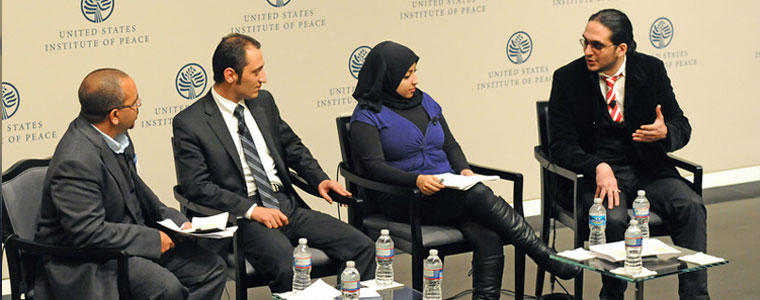Next Generation Peacebuilding and Social Change in the Arab World
In Iraq, "Salam Shabab" is the very first peacebuilding television program depicting the real life story of Iraqi youth. The series showcases not only a population that is often marginalized, but also the powerful desire and capacity of Iraqi youth to bring peace to their communities. The afternoon featured an exclusive screening of one episode from Season 1 of Salam Shabab, which aired in full on Iraq on Al Iraqiya and throughout the region on Space Power. A Q&A session with the show's producers followed the screening. USIP then welcomed a panel of dynamic young cultural leaders and activists from across the Middle East to discuss the role of youth in peacebuilding in the region. The evening concluded with a live performance by Iraqi pop band UTN1.

Young people throughout the Middle East and North Africa are having their own unique experiences driving social change and revolution in their countries. Meanwhile, Iraqi youth look ahead to their roles as leaders in the midst of continuing political crisis and violence. This event explored what connects and divides Iraqi youth from others across the region.
A panel of three dynamic young cultural leaders and activists from across the Middle East, cyberactivist Maryam al Khawaja from the Bahrain Center for Human Rights, renowned Syrian blogger Rami Nakhla aka Malath Aumran, and pop music icon Hassan al Faluji of the Iraqi pop band UTN1 discussed the role of youth in peacebuilding in the region. Their discussion was moderated by Adel Iskandar, professor of Arab media at Georgetown University.

In Iraq, "Salam Shabab" is the very first peacebuilding television program depicting the real life story of Iraqi youth. The series showcases not only a population that is often marginalized, but also the powerful desire and capacity of Iraqi youth to bring peace to their communities. The afternoon featured an exclusive screening of one episode from Season 1 of Salam Shabab, which aired in full in Iraq on Al Iraqiya and throughout the region on Space Power.
A question and answer session with the show's producers followed the screening. The evening concluded with a live performance by Iraqi pop band UTN1.
Behind the scenes shots of the filming of Salam Shabab, Season 1. | Full screen >>
Explore Further
- "Salam Shabab: Views and Voices of Iraqi Youth," Peace Brief, January 2011, by Theo Dolan and Alexis Toriello
- Salamshabab.com is a social networking forum for Iraqi youth to freely express themselves.
- "Salam Shabab" on Social Media:
4:00-4:15pm | Welcome Remarks
Manal Omar, Director of Iraq, Iran, and North Africa Programs
4:15-4:25 | Screening Introduction
- Hayder Hamzoz, youth blogger in Baghdad and Salam Shabab Street Team Leader.
- Theo Dolan, Moderator
USIP Senior Program Officer
Media, Conflict and Peacebuilding Center of Innovation
4:25-5:05 | Film Screening
"Salam Shabab," Episode 9: Season 1
5:05-5:20 | Remarks
Marsha Williams, President of Harvest Research Group LLC, presents key research results
5:20-5:55 | Production Q+A
- Hussam Hadi, Producer
- Brett Pierce, Co-Executive Producer and former Sesame Workshop Producer
- Afrah Mahdi, USIP Media Program Specialist in Baghdad
- Theo Dolan, Moderator
USIP Senior Program Officer
5:55-6:45 | Panel Discussion: Youth and the Arab Spring
- Maryam Al Khawaja, Head of Foreign Relations at the Bahrain Center for Human Rights
- Hassan al Faluji, lead singer for Iraq pop band UTN1
- Rami Nakhla (Malath Aumran), Syrian Activist/Blogger and Spokesperson for the Local Coordination Committees of Syria
- Adel Iskandar, Moderator
Adjunct Professor
Georgetown University Center for Contemporary Arab Studies and Communication, Culture and Technology
6:45-7:30 | Musical Performance
Featuring Iraqi Pop band UTN1



